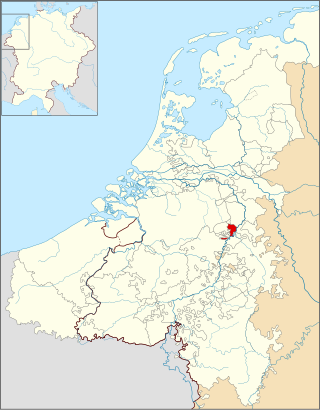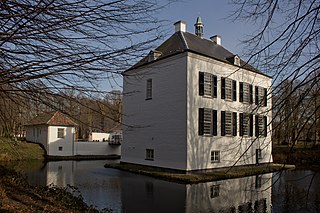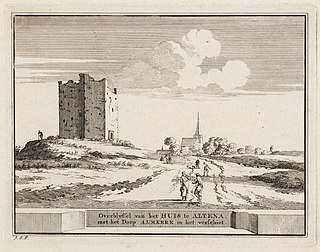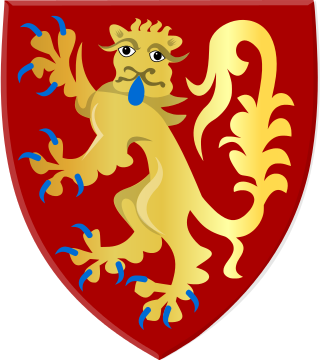Gerard II of Horne | |
|---|---|
| Lord of Horne | |
 Arms of Horne | |
| Predecessor | Willem IV of Horne |
| Successor |
|
| Born | 1324 [1] |
| Died | 26 September 1345 Near Stavoren |
| Mother | Oda van Putten |
Gerard II of Horne (1324 - 26 September 1345) was a medieval nobleman.
Gerard II of Horne | |
|---|---|
| Lord of Horne | |
 Arms of Horne | |
| Predecessor | Willem IV of Horne |
| Successor |
|
| Born | 1324 [1] |
| Died | 26 September 1345 Near Stavoren |
| Mother | Oda van Putten |
Gerard II of Horne (1324 - 26 September 1345) was a medieval nobleman.
Gerard van Horne, second lord of Horne named Gerard, was the son of Willem IV of Horne and Oda van Putten of Strijen. [1] He had 5 sisters. From his father's second marriage, Gerard had three half brothers and a half sister.
in 1342 Gerard's father made arrangements for his succession. Gerard was immediately made Lord of Heeze, Leende, the land of Montcornet and of Bancigny. On the death of his father, he was planned to succeed him as Lord of Gaasbeek. In turn he would then have to give Heeze, Leende and Herstal to the children of his father's second marriage. [2] It's not that clear whether arrangements were made for his other possessions, but maybe that was not necessary, or not possible.
After his father's death in 1343 Gerard succeed his father as Lord of Horne and Lord of Altena. [1] He also succeeded to the lordship of Venloon [3] One might assume that he also became lord of Weert and Kortessem. It's not clear whether he gave Heeze, Leende and Herstal to the children of his father's second marriage. [2]

In 1345 Gerard II joined William IV, Count of Holland in his campaign against Friesland. On 26 September 1345 almost the whole invasion army was annihilated near the Red Cliff in the Battle of Warns. Count William IV's uncle John of Beaumont was one of the few that escaped. Amongst the casualties were the Count of Holland, and a lot of noblemen. [4]
Gerard II was also amongst those that were killed. [4] See the below medieval verse, which refers to his coat of arms. It also notes that Gerard was one of the seven Knight bannerets on the Holland side, [5] which gives an idea of Gerard's standing in Holland.
Den beste here set ic voren, | The best lord I'll mention first, |
Gerard was not married. His many possessions were subject to different inheritance laws. They were also situated on the territory of different overlords. Therefore, the inheritance was divided amongst multiple claimants. His sister Johanna van Horne got some parts. Other parts went to his nephews of his father's second marriage.

The Hook and Cod wars comprise a series of wars and battles in the County of Holland between 1350 and 1490. Most of these wars were ostensibly fought over who should hold the title of "Count of Holland", but some have argued that the underlying reason was a power struggle conducted by the bourgeois in the cities against the ruling nobility.

Horne is a small historic county of the Holy Roman Empire in the present day Netherlands and Belgium. It takes its name from the village Horn, west of Roermond. The residence of the counts of Horne was moved from Horn to Weert in the 15th century.

The Avesnes family played an important role during the Middle Ages. The family has its roots in the small village Avesnes-sur-Helpe, in the north of France.

John II was a Franco-Dutch nobleman who ruled lands in both France and the Holy Roman Empire. He was the count of Blois and Dunois from 1372 until 1381, the lord of Avesnes, Schoonhoven, Gouda, Beaumont, Chimay and Waarde from 1356 until 1381 and the stadtholder of Holland and Zeeland in 1359–1360 and 1362–1363 during the absences of Count Albert of Bavaria. He was also a claimant jure uxoris to the Duchy of Guelders from 1372 until 1379.

William I, Duke of Bavaria-Straubing, was the second son of Emperor Louis IV and Margaret II of Hainaut. He was also known as William V, Count of Holland, as William III, Count of Hainaut and as William IV, Count of Zeeland.
John of Beaumont was a younger brother of count William III of Holland. He was the lord of Beaumont and count of Soissons by virtue of his marriage.

Dirk III van Brederode was lord of Brederode.

John II, Lord of Polanen was Lord of Polanen, Lord of De Lek and Lord of Breda.

John IV, Lord of Arkel was Lord of Arkel from 1326 until his death.

Loon op Zand Castle, is a castle in Loon op Zand, in the Dutch province of North Brabant. The current building looks like a manor, but is actually the keep of a medieval castle.

Tongelaar Castle is located between Mill and Gassel in North-Brabant, Netherlands.

Geldrop Castle is a castle with park near the center of Geldrop, North-Brabant, the Netherlands. It is on the edge of the valley of the Kleine Dommel.

Willem IV of Horne (1303-1343) was Lord of Altena, Weert, Nederweert, Wessem, Heeze, Leende, and Cortessem. From his niece Beatrice of Leuven he inherited Gaasbeek, Leeuw, Herstal and Montcornet.

Willem V of Horne was a medieval nobleman.

Dirk Loef of Horne was a medieval nobleman.

Willem VI of Horne was a Dutch Nobleman, the Lord of Horne.

Altena Castle is a former castle in Almkerk. It was home to the lords of Altena, and often of the lords of Horne and Altena.

Gerard (III) van Heemskerk, Lord of Heemskerk was a leader of the Cod Alliance during the opening phases of the Hook and Cod wars

Machteld van Voorne was Lady of Voorne, Monschau and Valkenburg, and burgrave of Zeeland. During the Hook and Cod wars she was an important ally of Count William V of Holland.

Floris I van Haamstede was Lord of Haamstede Castle on Schouwen, and of several other areas in Zeeland, Netherlands.